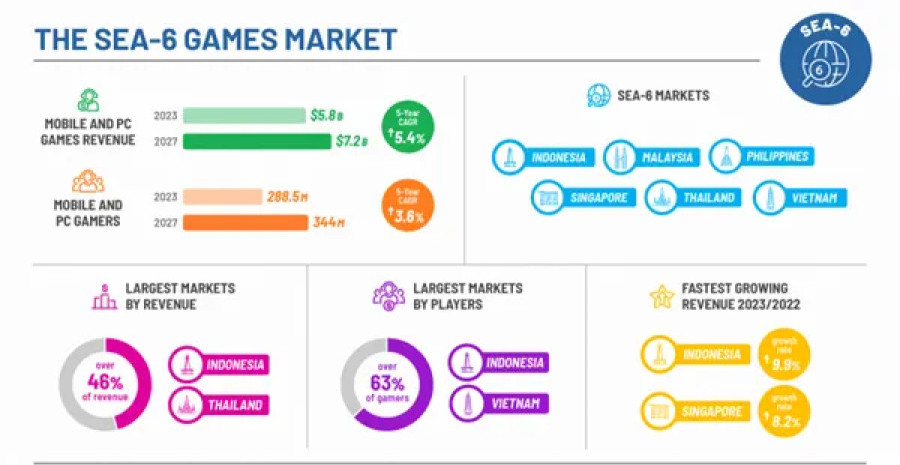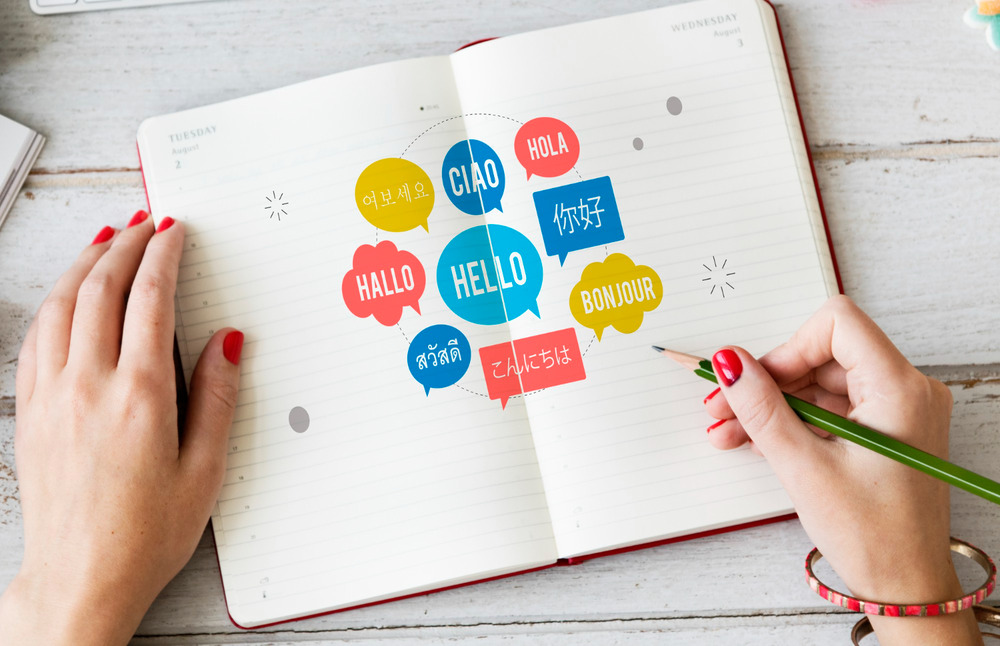
Do's and Don'ts to Dominate the Market Through Indonesian Game Localization
Wondering how to take the lead in the gaming market through Indonesian game localization? You're in the right place! Breaking into the Southeast Asian gaming market, especially in Indonesia, is a challenging endeavor. It feels like stepping into a new world with unfamiliar rules, guidelines, and languages. Successfully localizing a game for the Indonesian market requires more than just translating text. You must integrate cultural insights, technological aspects, and gamer psychology into your localization strategy.
Understanding the Indonesian Gaming Market

As the fourth largest country by population and the most densely populated in Southeast Asia, Indonesia commands a notable portion of the region's gaming market, accounting for 45.8% of all gamers in Southeast Asia. In addition, Indonesia is one of the top three gaming markets by revenue and is growing rapidly, which makes it an attractive prospect for game companies. However, successfully entering this market requires a deep understanding of its regulatory and cultural nuances.
By utilizing extensive market models and surveys involving over 2,400 gamers, you can obtain crucial insights into game publishers, leading genres, growth factors, esports, payment methods, financial transactions, regulations, and gamer preferences and behaviors. This information is vital for companies looking to effectively navigate Indonesian game localization.
Principles for Localizing Game Apps for the Indonesian Market When localizing game applications for the Indonesia market, consider that Indonesian language serves as a bridge among various regional languages and dialects. Utilize keywords in Indonesian, its dialects, English, Malay, and Javanese while building your semantic core.
Given that Islam is the predominant religion in Indonesia, it's important to consider this in both textual and visual optimization. Avoid symbols and language in your metadata that could offend Muslims. Young Indonesians frequently blend Indonesian with English and use fictional languages, a trend you can exploit when targeting a younger audience with your metadata. Pay close attention to grammar rules, including word order, enhancing commands with appropriate words, various pronoun forms, and reduplication. Incorporate user-generated content and legendary themes into your visual metadata to resonate more with local users. Additionally, since internet access in Indonesia tends to be slow, focus on minimizing your app's size and optimizing its speed for better performance.
The Do’s of Indonesian Game Localization

Entering the Indonesian gaming market requires careful consideration and adaptation to ensure your game appeals to local players. Successful localization involves more than just translating text; it also includes cultural, contextual, and technical considerations. Here are some key practices to follow for successful Indonesian game localization:
Pay Attention to the Length of the Translation
Managing translation duration is very important when localizing your game for the Indonesian market. Indonesian phrases are often 20% longer than English phrases, which can pose a challenge, especially in user interfaces where space is limited. For example, the English word "settings" translates to "pengaturan" in Indonesian, which is longer by several characters. When there are strict character limits, skilled translators may opt to leave certain terminology in English or omit a few words while ensuring the core message remains intact.
Character limits are frequently imposed because the translated text cannot exceed the length of the source text. This constraint complicates the selection of appropriate terms for translations. Consequently, the game translation process in Indonesia often requires transcreation—a process that involves creatively reinterpreting the text—rather than straightforward translation.
Provide Context for Your Indonesian Game Localization
When providing Indonesian game translation services, understanding the context is essential due to the presence of linguistic markers that don't have direct equivalents in English. These markers help convey nuances and relationships that are integral to the meaning of the text. For example, consider the English word "sister." In Indonesian, the context determines which specific term to use. The formal term "saudara perempuan" translates directly to "female sibling" but is often avoided in casual conversation due to its length.
Instead, Indonesians use "adik perempuan" to refer to a younger sister and "kakak perempuan" to refer to an older sister. If a game dialogue mentions a sister without specifying age, the translator needs additional context to choose the correct term. For instance, in a dialogue like "My sister is joining the game," knowing whether the sister is younger or older is crucial to translate it accurately.
Hire Experienced Gaming Industry Linguists
It's essential to collaborate with professional translators for your Indonesian game localization. Working with translators who have experience in the gaming industry ensures they have the necessary knowledge to effectively translate gaming content.
Furthermore, professional linguists who are also gamers bring a plus point—they understand the gaming terminology and culture, which is crucial for accurate and engaging translations. Gaming translations are not just about converting words from one language to another. They require a deep understanding of the gameplay mechanics, storylines, and player interactions. Therefore, strong communication skills are crucial. For example, a joke that works in English might fall flat in Indonesian if not properly adapted. A professional localizer would find an equivalent joke or expression that resonates with Indonesian players.
Use Special Testing
Use real-time video recording for game testers, especially in cultures where people tend not to provide direct feedback, such as Indonesia. Imagine a scenario where a game developer is testing a newly localized game in Indonesia. While traditional feedback methods such as surveys or interviews may yield polite or indirect responses, real-time video capture can reveal much more. For instance, if a player struggles repeatedly with a specific level but does not mention it during feedback sessions, the video will highlight these difficulties. The developer can then make necessary adjustments to improve the user experience.
The Don’ts of Indonesian Game Localization
When localizing games for the Indonesian market, it is crucial to avoid certain pitfalls that can distract players from the gaming experience. To help you, here are some frequent errors to steer clear of:
Don't Think Literal Translation
One common mistake in game translation is translating lines out of context without considering the characters or the interactions between them. This can confuse gamers and make the game feel disjointed. Similarly, translating English idioms too literally can lead to misunderstandings or awkward phrases in the game.
Consider a game where a character says, "Break a leg!" If this English idiom is translated literally into Indonesian, it would become "Patahkan kakimu," which is confusing and potentially alarming to players. Instead, the translator should find an equivalent phrase in Indonesian that conveys the same meaning, such as "Semoga sukses," which means "Good luck." Another critical aspect is knowing when not to translate certain terms. In gaming, some English terms are widely recognized and understood by players, making it more effective to keep them in English. For instance, in PUBG Mobile, skill names, item names, and common game terms are often left in English.
Terms like "headshot," "loot," and "kill streak" are commonly used and understood by Indonesian gamers. Translating these terms might disrupt the gaming experience and make it harder for players to relate to the gameplay.
Ignoring Sensitive Topics
When providing Indonesian game localization, it is crucial to avoid topics like religion and sexual orientation. It’s because Indonesia is predominantly Muslim and this religious context influences many aspects of daily life and social norms. In regions like Aceh, the local council has labeled PUBG games as sinful, claiming they insult their religion and may incite violent behavior among the youth. Likewise, characters with an openly LGBTQ+ identity may face rejection or backlash. To avoid potential problems, game developers must adapt the content to align with local values and expectations. This could mean changing the storyline, modifying character backgrounds, or removing certain elements altogether.
Ignoring Marketing Localizing
Apart from games, should marketing efforts also be localized? Of course yes! For instance, if your game has a strong presence on global social media platforms like Twitter and Facebook, it’s important to note that Indonesian gamers might be more active on platforms like Instagram, WhatsApp, and TikTok. Adapting your marketing efforts to focus on these popular local platforms can significantly increase your engagement. Collaborating with local influencers is another effective strategy. Influencers in Indonesia have a substantial impact on their followers' purchasing decisions. By partnering with well-known Indonesian gamers or influencers, you can create more authentic and relatable content.
In Conclusion
By following the do’s and don’ts of Indonesian game localization, you can bring an immersive and culturally appropriate gaming experience to Indonesian and even Southeast Asian players. Ready to tap into the Indonesian gaming market? Collaborate with Digital-Trans Asia for expert localization services.